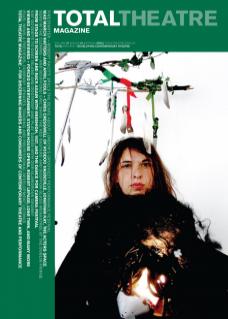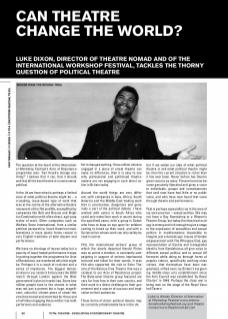The question at the heart of the International Workshop Festival’s Acts of Resistance programme was: ‘Can theatre change anything?’ I believe that it can, that it should, and that all the best theatre is in some sense political.
In the UK we have what is perhaps a limited view of what political theatre might be – a crusading, issue-based type of work that was at the centre of the alternative theatre movement of the 70s and 80s, exemplified by companies like Belt and Braces and Brighton Combination with often direct, agit-prop styles of work. Other companies such as Welfare State International, from a similar political perspective, found theatrical manifestations in more poetic forms rooted in very English traditions of both dissent and performance.
We have no shortage of issues today but a paucity of issue-based performance troops. In putting together the programme for Acts of Resistance, we wondered why that might be. Perhaps it is a result of cynicism and a sense of impotence. The biggest demonstration in our nation’s history was the 2003 march through London against the Blair government’s plan to invade Iraq. Some two million people took to the streets in what was not just a protest but a huge, magnificent, colourful, vibrant piece of street theatre that moved and stretched for three and a half miles engaging those within it as both performers and audience.
Yet it changed nothing. If two million citizens engaged in a piece of street theatre can make no difference, then it is easy to see why professional and politicised theatremakers are not engaging in such direct action in Britain today.
Around the world things are very different, with companies in Asia, Africa, South America and the Middle-East making work that is provocative, dangerous and genuinely a part of the political debate. I have worked with actors in South Africa who could only make their work in secret during the apartheid years, with a group in Sudan who have to keep an eye open for soldiers coming to break up their work, and with a Syrian writer whose work can only safely be read in secret.
PEN, the international writers’ group of which the dearly departed Harold Pinter was so active a member, is constantly campaigning in support of writers imprisoned, tortured and killed for their words. It was PEN who supported the visit to Soho Theatre of the Belarus Free Theatre that was a catalyst to our Acts of Resistance project. The Belarusian theatre group featured are very far from free in their own country, and their work is a direct challenge to their government and a source of succour and inspiration to their audiences.
Those forms of direct political theatre may be currently unfashionable here in the UK, but if we widen our idea of what political theatre is and what political theatre might be, then the current situation is richer than it has ever been. Never before has theatre given voice to so many. Theatre here has become genuinely liberated and gives a voice to individuals, groups and constituencies that until now have had little or no public voice, and who have now found that voice through theatre and performance.
That is perhaps especially true in the area of my own practice – sexual politics. We may not have a Gay Sweatshop or a Women’s Theatre Group, but today the theatrical ecology is strong and rich enough to give a stage to the expression of sexualities and sexual politics in manifestations impossible to imagine just a decade ago. Issues of female empowerment with The Whoopee Club, gay representation at Duckie and transgender identity from Gendelicious all give voice to different sexual politics and to sexual differences while doing so through forms of popular culture, specifically working-class culture, that themselves have been marginalised, stifled even, by Britain’s burgeoning middle-class arts establishment since the Arts Council was established ‘by Royal Charter’ in 1946. Perhaps the class war is being won on the stage of the Royal Vauxhall Tavern.
Luke is Artistic Director of International Workshop Festival www.internationalworkshopfestival.org and theatre nomad www.theatrenomad.com

